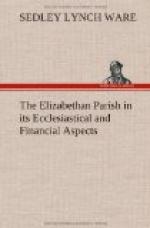The machinery which the canon and the civil law placed at the disposal of the ordinary for his judicial administration of the parish was extraordinarily flexible. Courts Christian were unencumbered by the formalities of the common law or by the cooeperation of juries. They could proceed ex officio, i.e., without formal presentment and upon hearsay only, and they were armed with the formidable power of administering the oath ex officio by which a parishioner was forced to disclose all he knew against himself. They could in all cases command the doing, as well as the giving[181] of a thing—powers far more extensive than those possessed by any court of equity of today. Lastly, it was their custom to require that a return be made in court, or in other words, a certification, that their commands had been duly performed—thus stamping them as true administrative bodies. It was inevitable from the nature of their jurisdiction and procedure that abuses should be committed both by ecclesiastical judges and by their officers, such as registrars, proctors and apparitors. These judges wielded an admirable instrument of administration and discipline, one that could be bent to meet any emergency, but this efficiency had been attained at the sacrifice of some indispensable safeguards for the carrying out of impartial justice. First, no parishioner’s acts, whether done in an official or a private capacity, were ever quite safe from misrepresentation, or downright falsification by his enemies, for secret denunciation to wardens




